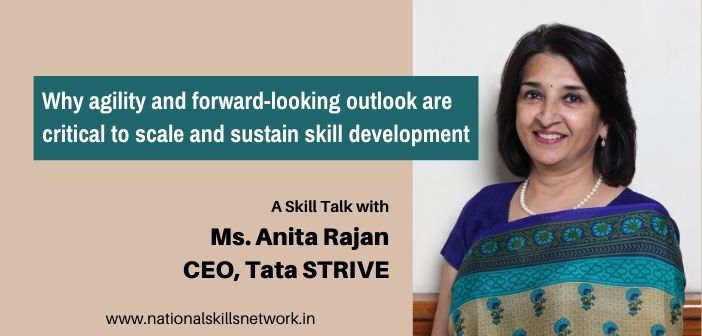
“Agility means constantly responding to the changes in the environment”, says Ms. Anita Rajan, CEO, Tata STRIVE, while sharing her thoughts on coping with the pandemic and continuing the skill development and training during the difficult times. If we look at the skill development and vocational training institutions today, it is only the most adaptive of them all which are surviving, once again proving Darwin’s theory of evolution.
This is where agility, forward-looking nature and a strong organisational foundation is needed to cope with evolving situations. In this Skill Talk, Ms. Anita Rajan, takes us through the initiatives and interventions that involved people, processes and technology.
Learn about Tata STRIVE courses and its initiatives in skill development – https://nationalskillsnetwork.in/tata-strive/
We present excerpts from our conversation. Please visit the link below for the complete video interview.
Q: How has Tata STRIVE been coping with the pandemic in continuing the skill development and training?
A: The pandemic has taken us all by surprise. First, it was a dramatic change that happened very quickly giving no time to prepare for it. When such events happen, if we haven’t built a strong foundation on certain strengths, then one will be taken off-guard. We have to be prepared all the time, as we do not know when such strengths would come into play.
Second, about the pandemic, it was a constantly evolving situation. During such situations, it is important to be able to understand what is happening now but also keep an eye on what will happen after this. Leadership must be aware of all these not only to address the emergency but also to plan for what is coming ahead.
Third, we kept in mind that we must come out stronger from this. We wanted to position Tata STRIVE in the best way possible before what will happen post-COVID. The first thing we did was to look after the safety of our employees. The second concern we had was about our students, as their learning must continue. This is where our strong foundation of focusing on innovation and adopting technology to re-imagine ourselves has come into play.
Technology was embedded into our processes. We had a database of people. Professional development of our faculty was also being tracked and made available. Agility was the hallmark of our mental framework. We had to be agile and adapt to every situation during the pandemic and we are doing it even now.
Now, agility meant that our faculty needed to become digital superstars. We had a big cross-functional team creating a model of blended learning. To be able to do this, we also needed to keep an eye on what should we teach because the environment was quickly changing. Sectors like hospitality were closing down, people were losing jobs. But there were other areas that were coming up like healthcare, digital skills, local jobs and rural entrepreneurship, contact-less home delivery services. We had to look at sectoral developments to understand shifts in the industry.
So, agility means constantly responding to the changes in the environment. This also meant we had to change the mindsets of the people. We promote a growth mindset in all our training programs. So, the people were open-minded to change, looking at new ideas, leaving out the old and adopting the new ideas.
Agility and being forward-looking also involves learning new skills. Of course, our faculty had to learn new skills, but with a shift in sectoral focus, we launched a program called Expand your Horizons, where faculty were given an opportunity to learn adjacent sectoral skills. We created cross-functional teams. We brought in people from partnerships who were talking to customers. We had faculty, we had technology team, all of these became a cross-functional team and together we were strategizing what should we do next.
There are two things that will be needed, one is being agile and quickly adapting to the changes in the next 3-4 years and the next thing is there is a constant requirement to innovate and re-think. We cannot be rigid with our models. When I say forward-looking, there are a couple of things that are going to happen because of the migration. Rural jobs are going to be of significance.
Under the Nano Unicorn Programme with the Government of Odisha, we invite students from ITIs, we give them funds from our donors to actually set up something. For three years we hold their hand. We have created a community of such entrepreneurs. Similarly, with the support of our partner Tata Capital, which is supporting an entrepreneurship program, we are linking this entrepreneurship program to the ecosystem of Sahyadri Farms.

Q: How can smaller organisations and companies prepare to be agile and forward-looking?
A: Response that is needed is immediate. So, therefore, the first thing they can do is to collaborate. To collaborate with a partner who can leapfrog on information, technology, and process. They will help partner with you and enable that journey to become faster. But at the same time, it is important to strengthen your own roots. Investing in people and having the right kind of team and their mindset is extremely important. Also, it is never too late to adopt technologies.
When we say agility, it also needs some kind of training. We created a course on what agility means to our employees. Also, instead of having a linear process, we can create cross-functional and smaller teams with direct connect with each other. Then, information flow happens faster. The use of technology should be done cleverly and strategically. There is a lot of technology that can help us to be agile. I think people, process and technology are the three key aspects.
Related article: Tata STRIVE copes with COVID-19 crisis through a holistic approach including digital learning – Read more: https://nationalskillsnetwork.in/tata-strive-copes-with-covid-19-crisis-through-a-holistic-approach-including-digital-learning/
Q: How do we strengthen district-level skill development?
A: Districts are the microcosm of larger India. All governance is actually structured around districts. This is why we mandated a study on creating a district skill development framework. This study looks at various players in the district. Under players, there are employers, small or large industries. We talk to employers, about what the future of their industry looks like and we talk to young people to find out their aspirations. Our strategy would be to look at the local industry, to look at local produce, what are the kind of opportunities in the agriculture sector, and to look through district lens to figure out what are the kind of jobs that are needed. In districts, it is not always the agri or the agri-allied activities. We should look at opportunities for rural women to become local entrepreneurs.
Finally, I would like to say that any organisation in the social space are dealing with the challenge of quality and scale along with keeping the local flavour.













Comments 3